Abstract
The plasma levels of the urate-binding α1-α2-globulin, as determined by its urate-binding capacity, have been recorded in 19 individuals from two gouty kindreds. A significantly reduced binding capacity, accounting for 13-30% of the mean value obtained in healthy, unrelated control subjects, was found in all cases of gout and in the single case of essential hyperuricemia included in the present study. In addition, six apparently healthy members of one of these kindreds also exhibited this characteristic. The distribution of the characteristic in three subsequent generations from this kindred further supported the hypothesis that the reduced binding capacity was inherited as an autosomal trait for which affected subjects were heterozygous.
Based on the present observation, the mechanisms of inheritance in primary gout are discussed with special emphasis on the possible cooperation of genetic and environmental factors.
Full text
PDF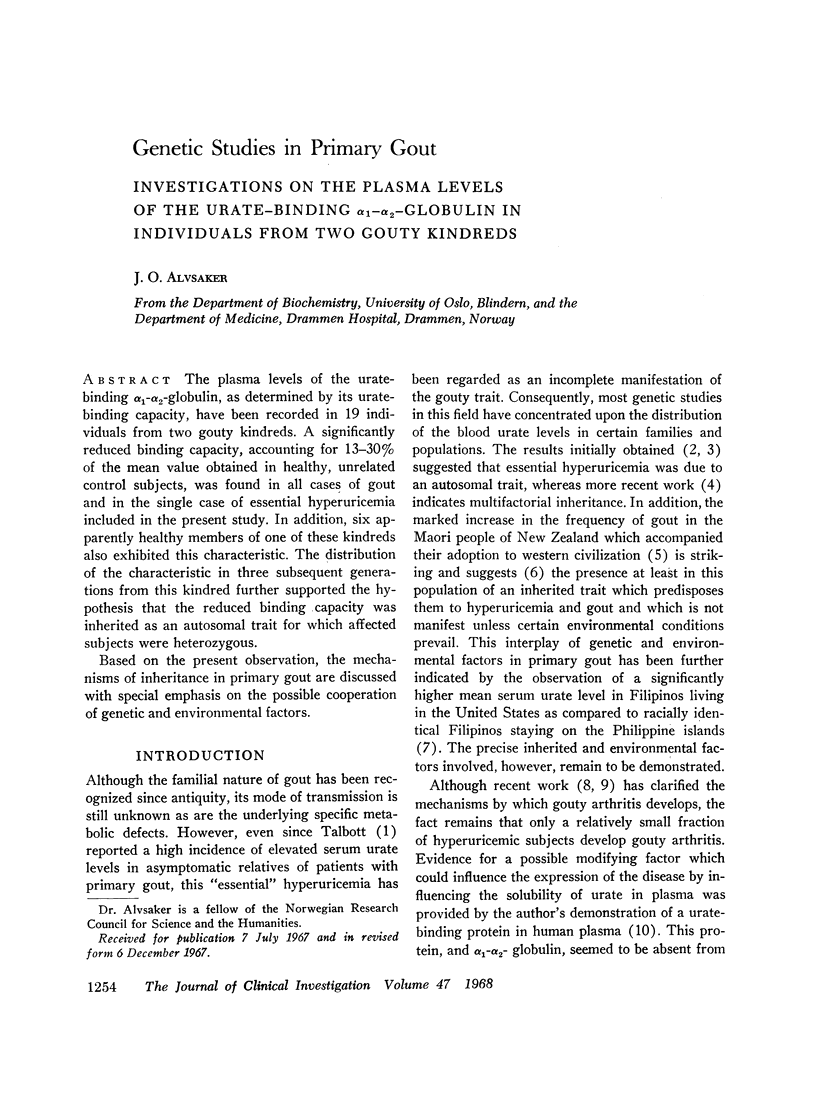
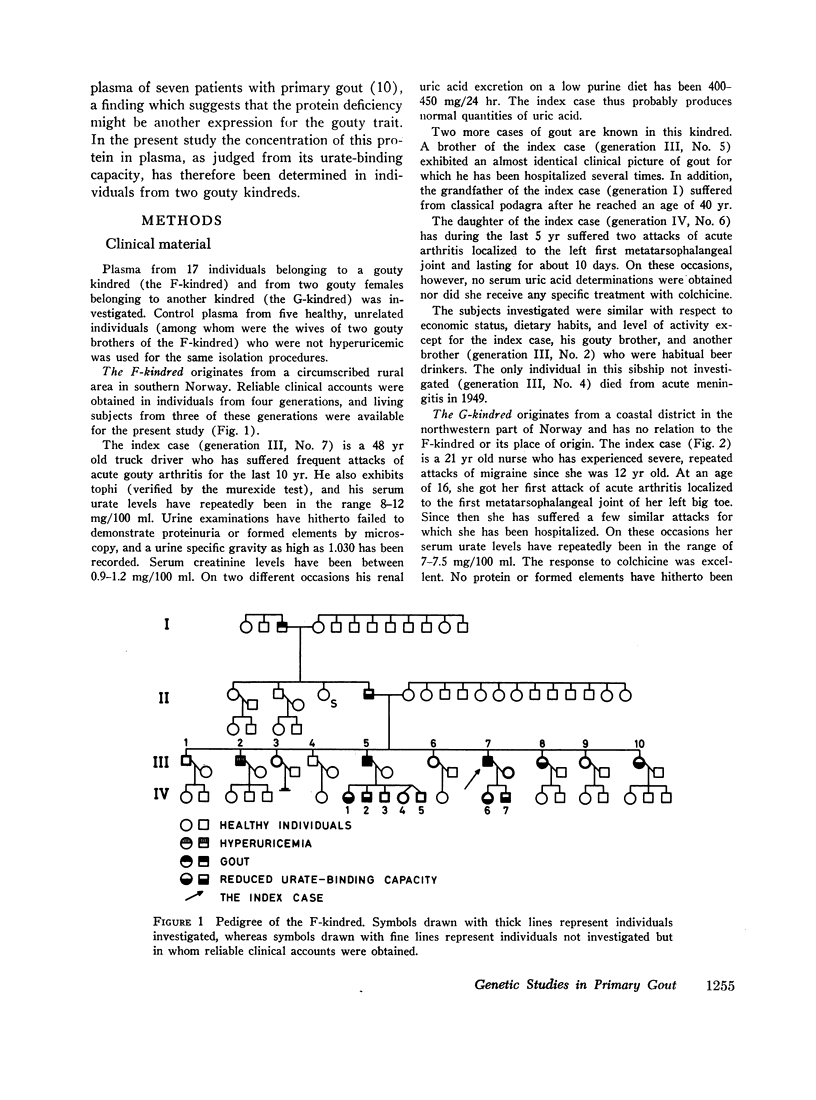
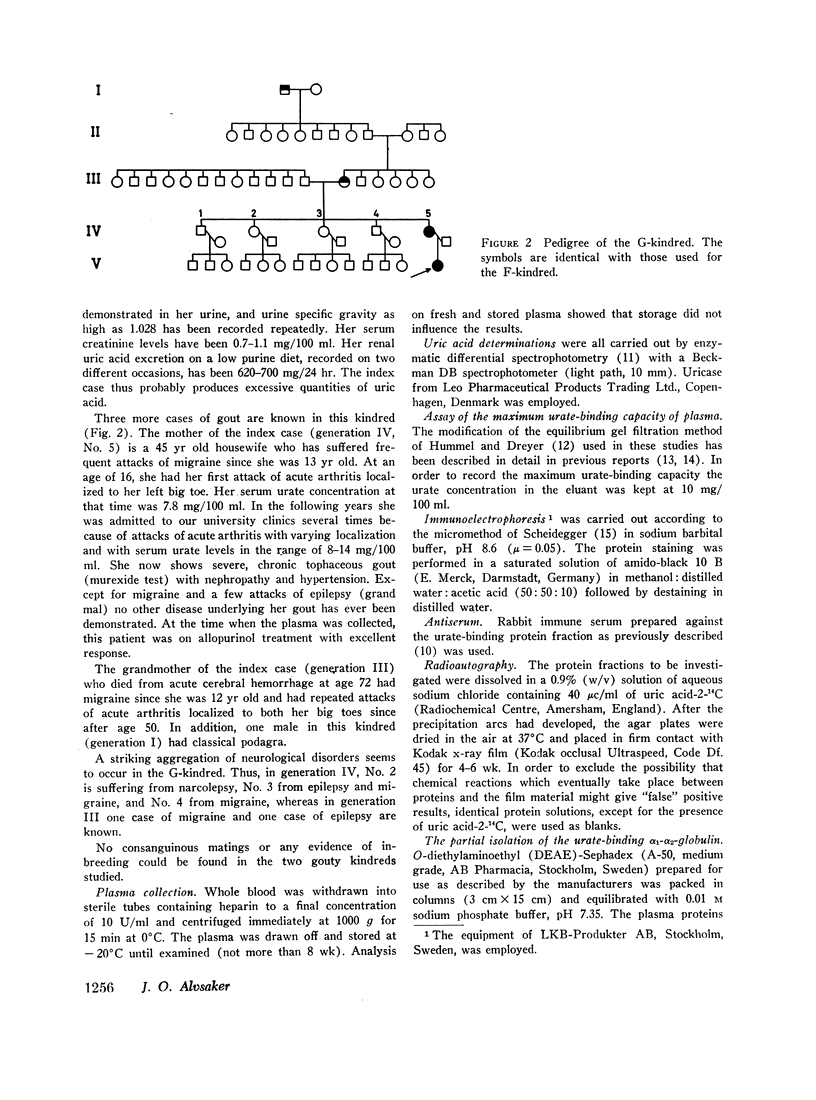
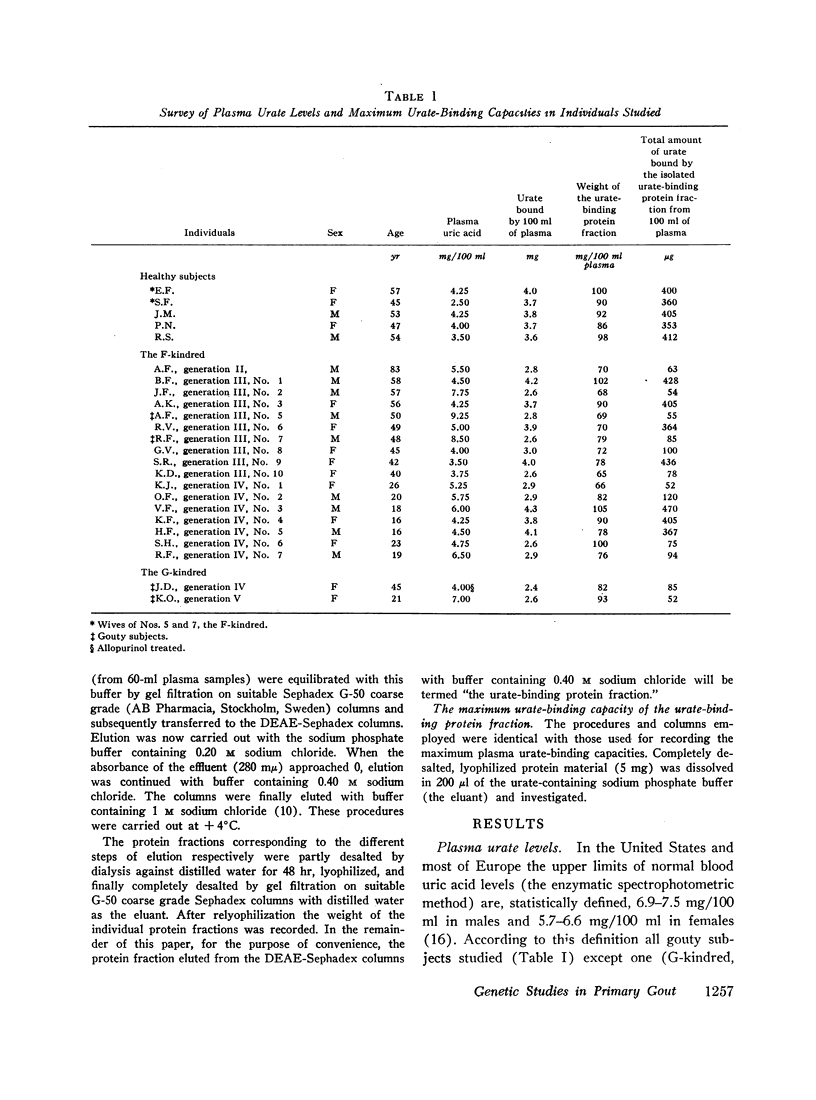
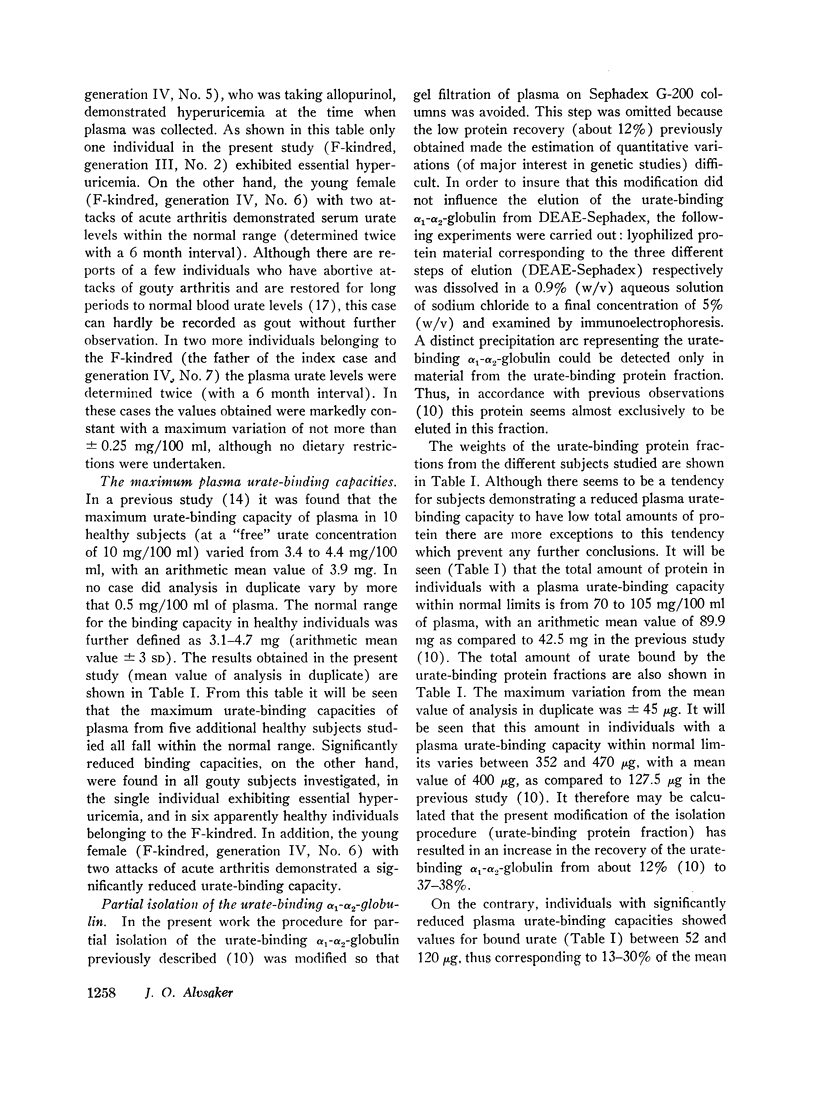
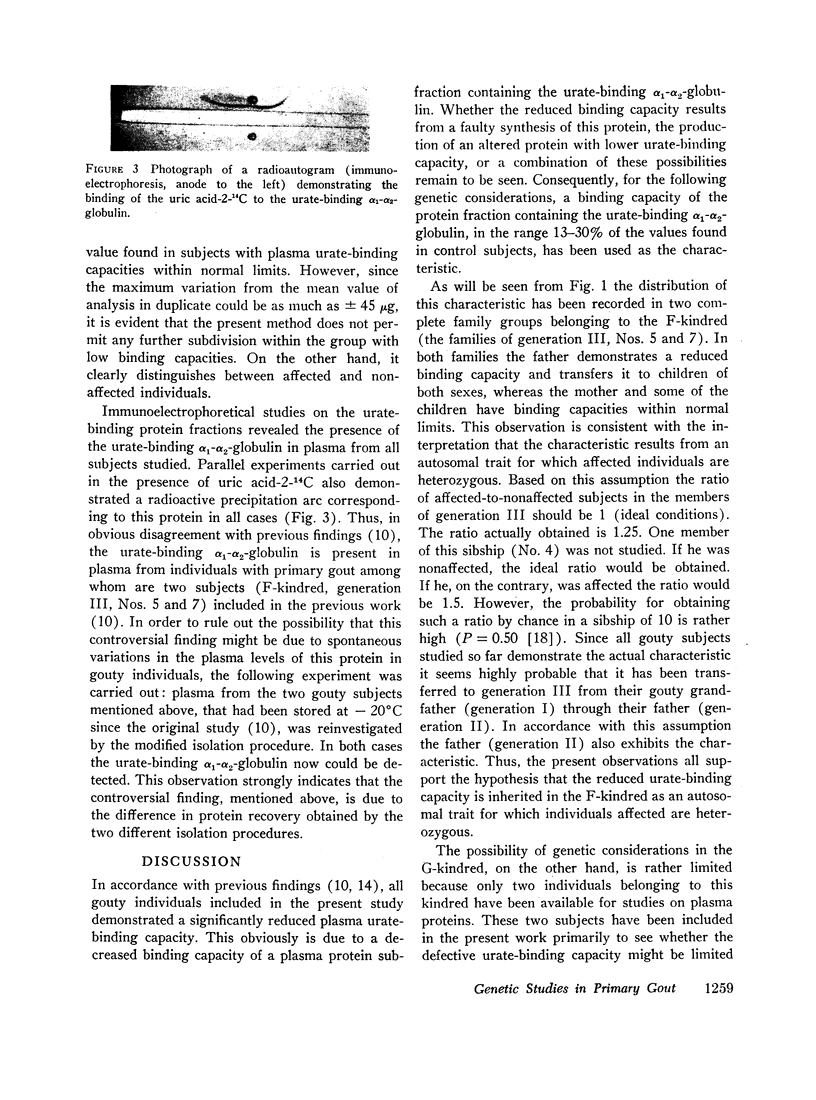
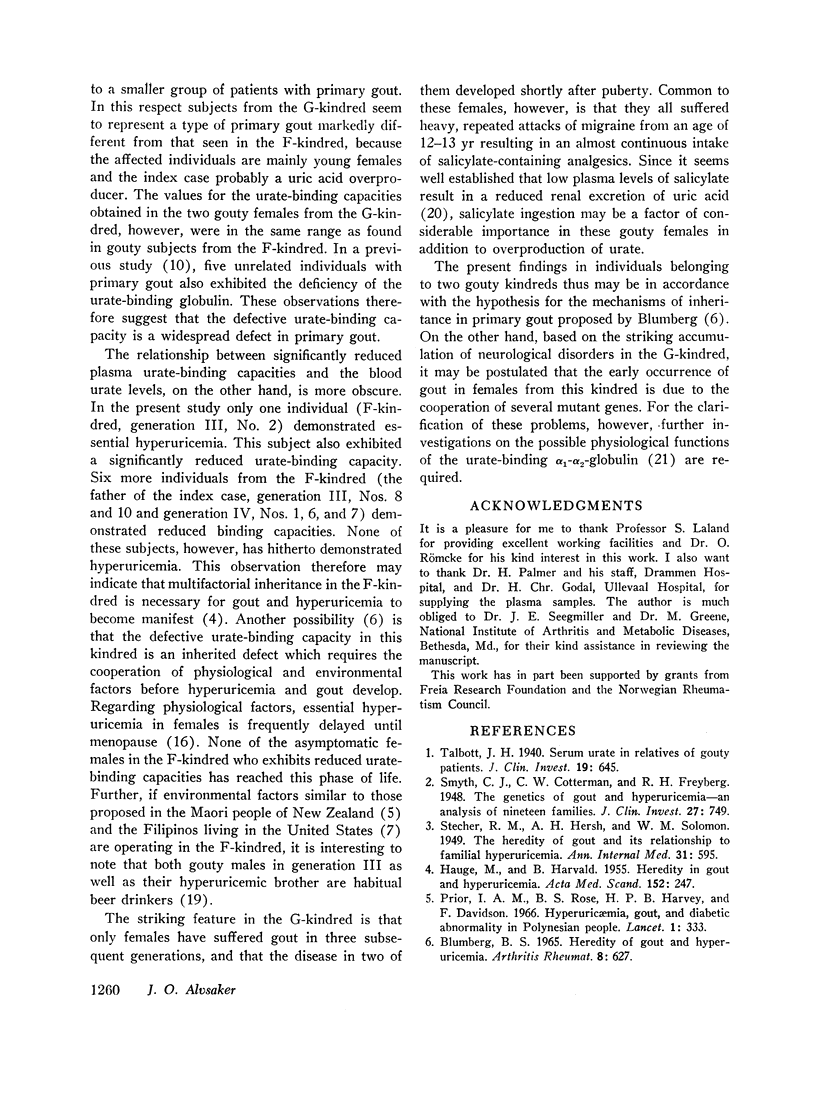
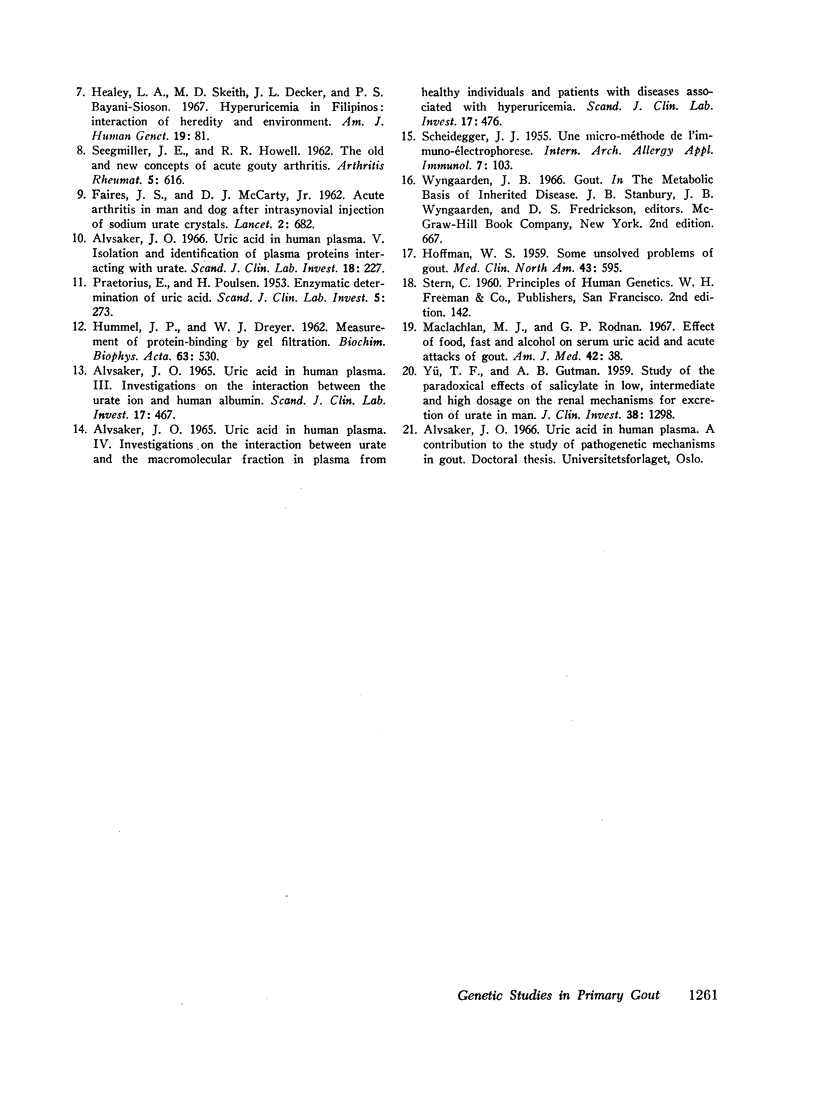
Images in this article
Selected References
These references are in PubMed. This may not be the complete list of references from this article.
- Alvsaker J. O. Uric acid in human plasma. 3. Investigations on the interaction between the urate ion and human albumin. Scand J Clin Lab Invest. 1965;17(5):467–475. [PubMed] [Google Scholar]
- Alvsaker J. O. Uric acid in human plasma. IV. Investigations on the interactions between urate and the macromolecular fraction in plasma from healthy individuals and patients with diseases associated with hyperuricemia. Scand J Clin Lab Invest. 1965;17(5):476–482. [PubMed] [Google Scholar]
- Alvsaker J. O. Uric acid in human plasma. V. Isolation and identification of plasma proteins interacting with urate. Scand J Clin Lab Invest. 1966;18(2):227–239. doi: 10.3109/00365516609051819. [DOI] [PubMed] [Google Scholar]
- Blumberg B. S. Heredity of gout and hyperuricemia. Arthritis Rheum. 1965 Oct;8(5):627–647. doi: 10.1002/art.1780080423. [DOI] [PubMed] [Google Scholar]
- HAUGE M., HARVALD B. Heredity in gout and hyperuricemia. Acta Med Scand. 1955 Nov 10;152(4):247–257. doi: 10.1111/j.0954-6820.1955.tb03485.x. [DOI] [PubMed] [Google Scholar]
- HOFFMAN W. S. Some unsolved problems of gout. Med Clin North Am. 1959 Mar;43(2):595–606. doi: 10.1016/s0025-7125(16)34172-4. [DOI] [PubMed] [Google Scholar]
- HUMMEL J. P., DREYER W. J. Measurement of protein-binding phenomena by gel filtration. Biochim Biophys Acta. 1962 Oct 8;63:530–532. doi: 10.1016/0006-3002(62)90124-5. [DOI] [PubMed] [Google Scholar]
- Healey L. A., Skeith M. D., Decker J. L., Bayani-Sioson P. S. Hyperuricemia in Filipinos: interaction of heredity and environment. Am J Hum Genet. 1967 Mar;19(2):81–85. [PMC free article] [PubMed] [Google Scholar]
- Maclachlan M. J., Rodnan G. P. Effect of food, fast and alcohol on serum uric acid and acute attacks of gout. Am J Med. 1967 Jan;42(1):38–57. doi: 10.1016/0002-9343(67)90005-8. [DOI] [PubMed] [Google Scholar]
- PRAETORIUS E., POULSEN H. Enzymatic determination of uric acid; with detailed directions. Scand J Clin Lab Invest. 1953;5(3):273–280. doi: 10.3109/00365515309094197. [DOI] [PubMed] [Google Scholar]
- Prior I. A., Rose B. S., Harvey H. P., Davidson F. Hyperuricaemia, gout, and diabetic abnormality in Polynesian people. Lancet. 1966 Feb 12;1(7433):333–338. doi: 10.1016/s0140-6736(66)91320-1. [DOI] [PubMed] [Google Scholar]
- SCHEIDEGGER J. J. Une micro-méthode de l'immuno-electrophorèse. Int Arch Allergy Appl Immunol. 1955;7(2):103–110. [PubMed] [Google Scholar]
- SEEGMILLER J. E., HOWELL R. R. The old and new concepts of acute gouty arthritis. Arthritis Rheum. 1962 Dec;5:616–623. doi: 10.1002/art.1780050610. [DOI] [PubMed] [Google Scholar]
- STECHER R. M., HERSH A. H., SOLOMON W. M. The heredity of gout and its relationship to familial hyperuricemia. Ann Intern Med. 1949 Oct;31(4):595–614. doi: 10.7326/0003-4819-31-4-595. [DOI] [PubMed] [Google Scholar]
- Smyth C. J., Cotterman C. W., Freyberg R. H. THE GENETICS OF GOUT AND HYPERURICEMIA-AN ANALYSIS OF NINETEEN FAMILIES. J Clin Invest. 1948 Nov;27(6):749–759. doi: 10.1172/JCI102025. [DOI] [PMC free article] [PubMed] [Google Scholar]
- Talbott J. H. SERUM URATE IN RELATIVES OF GOUTY PATIENTS. J Clin Invest. 1940 Jul;19(4):645–648. doi: 10.1172/JCI101167. [DOI] [PMC free article] [PubMed] [Google Scholar]
- YU T. F., GUTMAN A. B. Study of the paradoxical effects of salicylate in low, intermediate and high dosage on the renal mechanisms for excretion of urate in man. J Clin Invest. 1959 Aug;38(8):1298–1315. doi: 10.1172/JCI103905. [DOI] [PMC free article] [PubMed] [Google Scholar]



